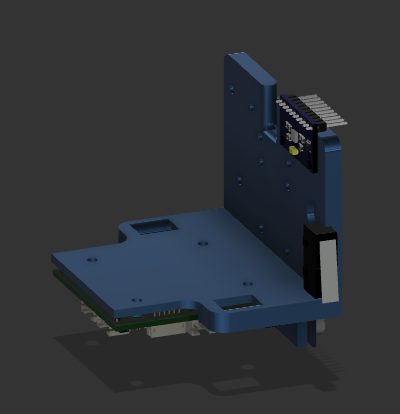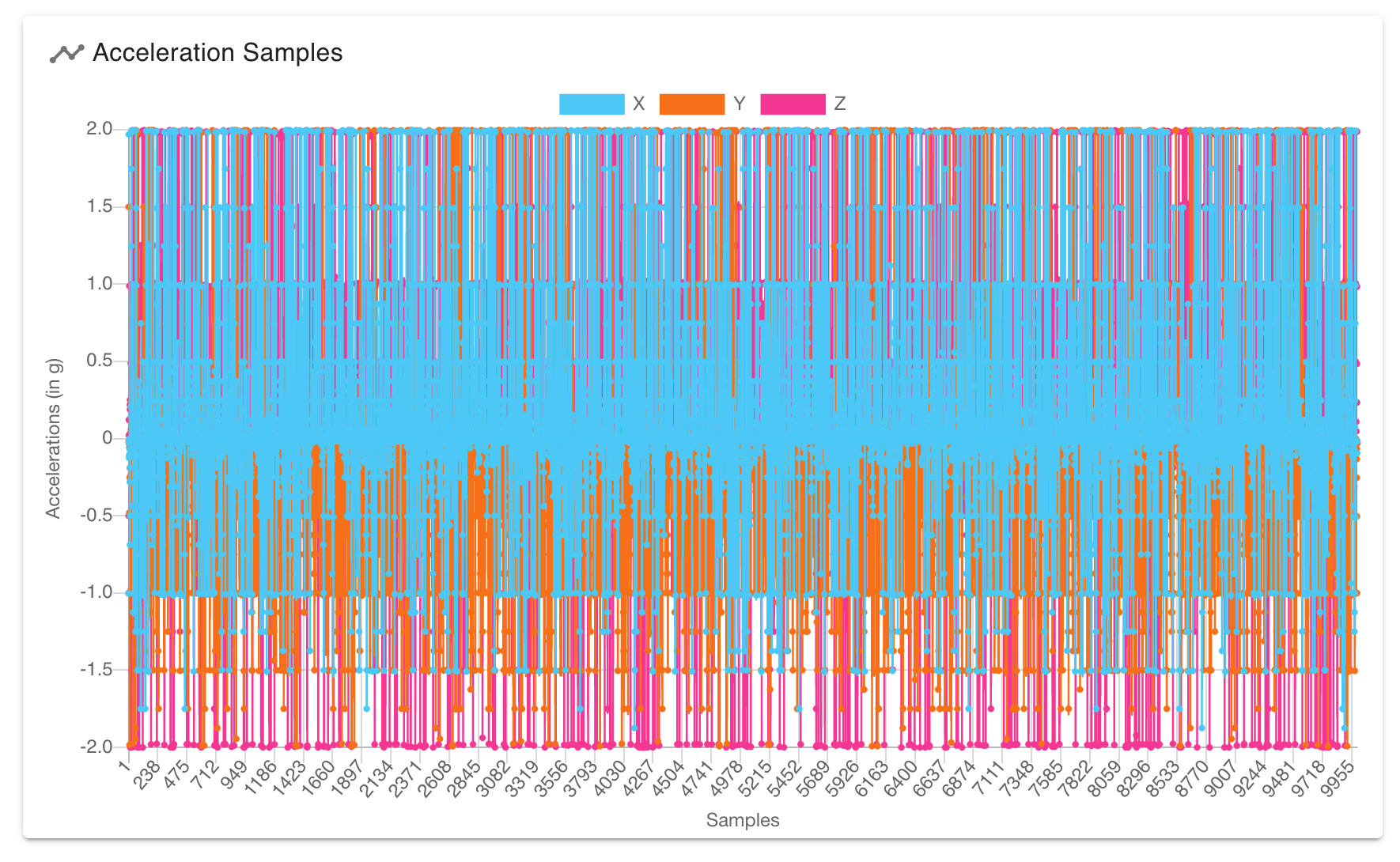Accelerometer Usage
-
@dc42
M115 B 121
FIRMWARE_NAME: RepRapFirmware for Duet 3 MB6HC FIRMWARE_VERSION: 3.4.0beta2 ELECTRONICS: Duet 3 MB6HC v0.6 or 1.0 FIRMWARE_DATE: 2021-08-03 12:42:44 -
@sotidii said in Accelerometer Usage:
@dc42
M115 B 121
FIRMWARE_NAME: RepRapFirmware for Duet 3 MB6HC FIRMWARE_VERSION: 3.4.0beta2 ELECTRONICS: Duet 3 MB6HC v0.6 or 1.0 FIRMWARE_DATE: 2021-08-03 12:42:44Run the command again, but don't put a space between the B and the 121.
-
@dc42
M115 B121
Duet TOOL1LC firmware version 3.3RC3 (2021-05-26 12:30:20) -
@sotidii said in Accelerometer Usage:
Duet TOOL1LC firmware version 3.3RC3 (2021-05-26 12:30:20)
Please upgrade the tool board firmware to version 3.4beta2.
-
@dc42 OK!
-
@dc42 said in Accelerometer Usage:
@ccs86 said in Accelerometer Usage:
@dc42 said in Accelerometer Usage:
Reading one less sample doesn't help. I can only assume that communicating with the accelerometer creates an electrical disturbance that slightly affects the reading.
If you read only 10 samples at a time, do the peaks appear at that new interval?
I didn't try that. I did find that the LIS3DSH has smaller peaks are multiples of 20 samples than the LIS3DH.
Is eliminating these false peaks something you plan on pursuing? It seems like they have the ability to skew the analysis.
I tried manually removing the peak samples from a copy of one of my logs, for the purpose of comparing the analyzed result. But while the modified log is displayed correctly in DWC, the analysis always shows a blank chart.
-
@ccs86 said in Accelerometer Usage:
Is eliminating these false peaks something you plan on pursuing? It seems like they have the ability to skew the analysis.
I have already looked into it, and come to the conclusion that reading the data is what caused the spurious peaks. Apart from avoiding wires running very close to the accelerometer chip, I don't think much can be done about it, except perhaps randomising the times at which data is read.
The spurious peaks I see from my LIS3DH accelerometers are very much lower than in your plot, and even lower for my LIS3DSH accelerometer. Perhaps you have either a bad accelerometer, or a wire running right over the chip or right under the PCB.
-
@dc42 said in Accelerometer Usage:
The spurious peaks I see from my LIS3DH accelerometers are very much lower than in your plot, and even lower for my LIS3DSH accelerometer. Perhaps you have either a bad accelerometer, or a wire running right over the chip or right under the PCB.
In the graph I posted, the Y axis scale was between 1.15 and 0.85. Your graph was 1.2 to -0.2. That is a vertical compression of 4.66 times, which visually downplays the peaks.
Even if yours don't have quite as much amplitude, they are still erroneous data on up to 5% of the samples taken. To me, that surely need to be addressed if you want accurate analysis.
-
@ccs86 if you use the Analyse button, I think you will see that the energy in those spurious peaks is much lower than the energy in genuine ringing. Nevertheless, if this proves to be a problem then I will look at randomising the read times somewhat to spread the spectrum out.
-
One could apply a statistical hack if one really knows the problem is every 20 samples, and either the first or last sample in a batch. One can just replace the (known) bad point with the average of the point before and after. This doesn't change the power spectrum significantly. This is equivalent to adding a random Dirac comb of small amplitude (the difference between the correct, missing point and the average) to the data, which has only a very weak effect on the spectrum. The noise floor at frequencies which are harmonics of (sampling rate / 40) will be slightly raised.
-
@dc42
How critical is the way the board is mounted?
Above picture is a mockup with another accelerometer.
As I am only going to use only X axis in this case does it really matter how it is mounted?
-
@mendenmh said in Accelerometer Usage:
One could apply a statistical hack if one really knows the problem is every 20 samples, and either the first or last sample in a batch. One can just replace the (known) bad point with the average of the point before and after. This doesn't change the power spectrum significantly. This is equivalent to adding a random Dirac comb of small amplitude (the difference between the correct, missing point and the average) to the data, which has only a very weak effect on the spectrum. The noise floor at frequencies which are harmonics of (sampling rate / 40) will be slightly raised.
As a straightforward fix I think that is a great idea.
-
I did some more testing and found something interesting. This makes me think that the erroneous spikes don't have anything to do with wiring.
Running back to back tests, with the only change being the inclusion / omission of the "X" parameter in the M956 call (just X axis, or XYZ):
Just X:

XYZ:

Just X still has some spike on the 20 sample intervals, but they appear much worse when logging all 3 axes (~double).
And here are the analyzed results. Not vastly different, but different enough to warrant elimination of that bad data:


-
Somewhat off topic, but this is wild. Here is the analysis of X at 5k / 10k / 15k accel. I did not expect such a big difference when increasing accel to 15k. Makes me suspicious:
5k:

10k:

15k:

-
At this point, I am getting almost no overflows reported, without actually changing anything. Odd.
Is it possible to log at faster than 1344 Hz? The sensor seems to be capable of 5000 Hz, but the "S" parameter doesn't seem to work in the M955 command. I have only ever gotten 1344 Hz and 400 Hz replies in the console.
Also, DWC seems to infer a sampling rate of 1331 Hz, while RRF says 1344 Hz. Only a 1% difference, but I'm guessing it shifts the analysis result slightly. Not sure whether DWC is accurately sensing a 1331 Hz logging rate, on a desired 1344 Hz. Or, if it should be changed to match.
-
@ccs86 said in Accelerometer Usage:
Somewhat off topic, but this is wild. Here is the analysis of X at 5k / 10k / 15k accel. I did not expect such a big difference when increasing accel to 15k. Makes me suspicious:
If the time taken to accelerate or decelerate is about half the period of ringing, that will tend to suppress the ringing. That is how DAA worked. I suggest you calculate the acceleration/deceleration time, i.e. the feed rate of your test move in mm/sec divided by the acceleration.
-
@ccs86 said in Accelerometer Usage:
Is it possible to log at faster than 1344 Hz? The sensor seems to be capable of 5000 Hz, but the "S" parameter doesn't seem to work in the M955 command. I have only ever gotten 1344 Hz and 400 Hz replies in the console.
In theory the code support 5kHz, but it's unlikely to work when using a direct SPI connection. The LIS3DSH supports 1600Hz instead of 1344Hz.
Also, DWC seems to infer a sampling rate of 1331 Hz, while RRF says 1344 Hz. Only a 1% difference, but I'm guessing it shifts the analysis result slightly. Not sure whether DWC is accurately sensing a 1331 Hz logging rate, on a desired 1344 Hz. Or, if it should be changed to match.
The sensor data rate is only approximate (the manufacturer told me +/-20% AFAIR), so RRF measures it and includes the actual data rate in the .csv file.
-
@dc42 said in Accelerometer Usage:
@ccs86 said in Accelerometer Usage:
Somewhat off topic, but this is wild. Here is the analysis of X at 5k / 10k / 15k accel. I did not expect such a big difference when increasing accel to 15k. Makes me suspicious:
If the time taken to accelerate or decelerate is about half the period of ringing, that will tend to suppress the ringing. That is how DAA worked. I suggest you calculate the acceleration/deceleration time, i.e. the feed rate of your test move in mm/sec divided by the acceleration.
Is that calculation only valid with jerk set to zero, or do you think it holds?
-
@dc42 said in Accelerometer Usage:
@ccs86 said in Accelerometer Usage:
Is it possible to log at faster than 1344 Hz? The sensor seems to be capable of 5000 Hz, but the "S" parameter doesn't seem to work in the M955 command. I have only ever gotten 1344 Hz and 400 Hz replies in the console.
In theory the code support 5kHz, but it's unlikely to work when using a direct SPI connection. The LIS3DSH supports 1600Hz instead of 1344Hz.
Also, DWC seems to infer a sampling rate of 1331 Hz, while RRF says 1344 Hz. Only a 1% difference, but I'm guessing it shifts the analysis result slightly. Not sure whether DWC is accurately sensing a 1331 Hz logging rate, on a desired 1344 Hz. Or, if it should be changed to match.
The sensor data rate is only approximate (the manufacturer told me +/-20% AFAIR), so RRF measures it and includes the actual data rate in the .csv file.
Is there a reason that we can't set a specific sampling rate with the "S" parameter, as documented?
and do you have any thoughts on the erroneous spike data I posted above?
-
I discovered in my setup that attaching the accelerometer directly to the coils of a driven stepper motor produces less than useful results.
